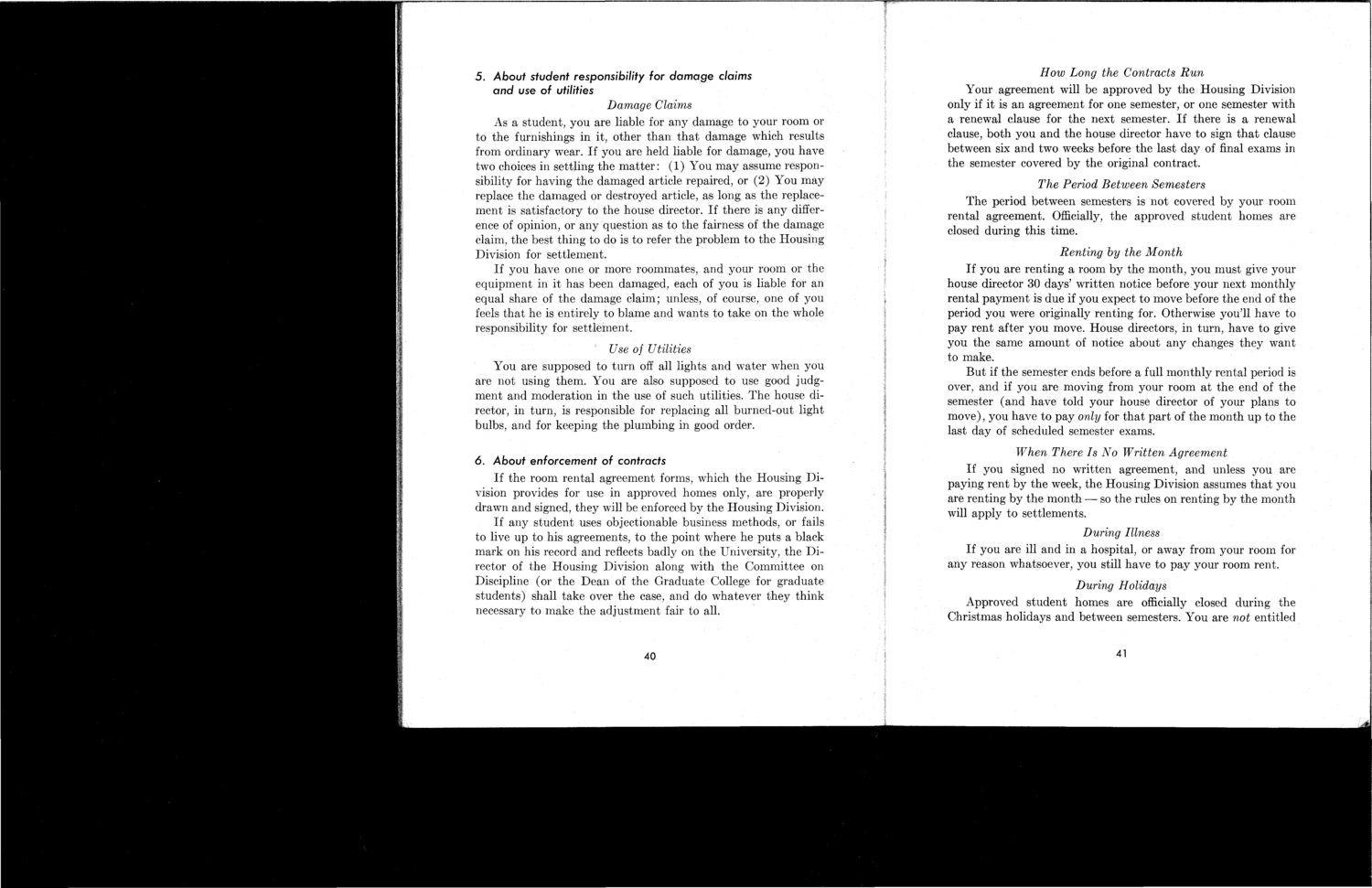| |
| |
Caption: Booklet - Handbook of Student Housing (1950)
This is a reduced-resolution page image for fast online browsing.

EXTRACTED TEXT FROM PAGE:
5. About student responsibility and use of utilities for damage claims Damage Claims As a student, you are liable for any damage to your room or to the furnishings in it, other than that damage which results from ordinary wear. If you are held liable for damage, you have two choices in settling the matter: (1) You may assume responsibility for having the damaged article repaired, or (2) You may replace the damaged or destroyed article, as long as the replacement is satisfactory to the house director. If there is any difference of opinion, or any question as to the fairness of the damage claim, the best thing to do is to refer the problem to the Housing Division for settlement. If you have one or more roommates, and your room or the equipment in it has been damaged, each of you is liable for an equal share of the damage claim; unless, of course, one of you feels that he is entirely to blame and wants to take on the whole responsibility for settlement. Use of Utilities You are supposed to turn off all lights and water when you are not using them. You are also supposed to use good judgment and moderation in the use of such utilities. The house director, in turn, is responsible for replacing all burned-out light bulbs, and for keeping the plumbing in good order. 6. About enforcement of contracts How Long the Contracts Run Your agreement will be approved by the Housing Division only if it is an agreement for one semester, or one semester with a renewal clause for the next semester. If there is a renewal clause, both you and the house director have to sign that clause between six and two weeks before the last day of final exams in the semester covered by the original contract. The Period Between Semesters The period between semesters is not covered by your room rental agreement. Officially, the approved student homes are closed during this time. Renting by the Month If you are renting a room by the month, you must give your house director 30 days' written notice before your next monthly rental payment is due if you expect to move before the end of the period you were originally renting for. Otherwise you'll have to pay rent after you move. House directors, in turn, have to give you the same amount of notice about any changes they want to make. But if the semester ends before a full monthly rental period is over, and if you are moving from your room at the end of the semester (and have told your house director of your plans to move), you have to pay only for that part of the month up to the last day of scheduled semester exams. When There Is No Written Agreement If you signed no written agreement, and unless you are paying rent by the week, the Housing Division assumes that you are renting by the month — so the rules on renting by the month will apply to settlements. During Illness If you are ill and in a hospital, or away from your room for any reason whatsoever, you still have to pay your room rent. During Holidays Approved student homes are officially closed during the Christmas holidays and between semesters. You are not entitled 41 If the room rental agreement forms, which the Housing Division provides for use in approved homes only, are properly drawn and signed, they will be enforced by the Housing Division. If any student uses objectionable business methods, or fails to live up to his agreements, to the point where he puts a black mark on his record and reflects badly on the University, the Director of the Housing Division along with the Committee on Discipline (or the Dean of the Graduate College for graduate students) shall take over the case, and do whatever they think necessary to make the adjustment fair to all. 40
| |